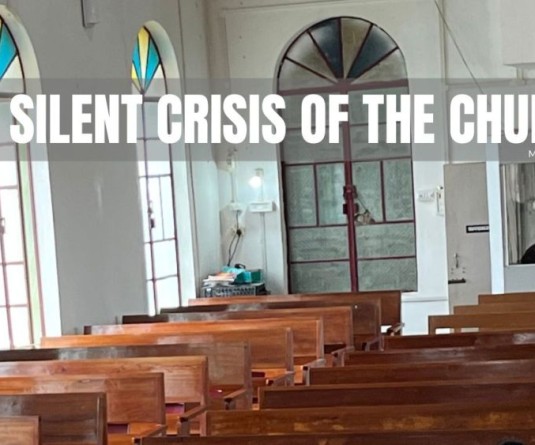
We hear people say that our churches are full of hypocrites. I too agree. But it is the beauty of the church that hypocrites and all twisted people are still welcome. Our churches also have the best people that you will ever meet (for example, see last paragraph). They may not be as visible as celebrities, star performers or big church donors, but they are there amongst us. In a society which celebrates wealth, fame and looks; these ‘ordinary’ Christians live out their lives faithfully often away from the spotlight.
Some people say, ‘I love Jesus but I hate church’. And we have a good number of people professing to be Christians who don’t go to church. It is difficult to explain how a person can call herself a Christian and not go to church. If not in some extraordinary exceptions (say, you are shipwrecked and marooned in a desert island where there is no church), a Christian is by definition someone who goes to church; someone who belongs to the community of believers. So, if someone says that the church is full of hypocrites and do not go to church, but still writes ‘Religion: Christianity’ in her certificates; one wonders who the real hypocrite is.
Our Naga churches have been attacked from left and right. We see it in the newspapers, social networking sites in the internet, and overhear colleagues, family members, and friends talking about it. I believe that many of the charges are true; I being one who wrote a critique of our churches called ‘Are the Naga churches heading the Dinosaur way?’ I am humbled by the positive responses to the article, especially from those within the church. There seems to be a consensus, a common feeling, that something is terribly wrong with our churches today. Our churches need to consider where they stand. But I was also left with a deep thought that those who are cynical about the church might have read only the negatives and used them to fuel hatred for the church. Since then, I have been thinking of writing this follow-up article in defense of the church. This is a call to ‘not throw out the baby with the bath water’.
Brought up in a protestant family, and deeply involved in evangelical fellowships, I was taught that my personal relationship with Jesus is supreme and not much importance was given to the church. I even looked at church negatively: the religiosity, the institution, the traditions, and the formalities. Perhaps this is a typical and common protestant evangelical feeling. But there was much I needed to learn. I believe, more than ever, we Protestants (particularly in the evangelical circles) need to learn to appreciate the usefulness of traditions and rituals in Christian worship but this article is not the place to explain that. What about the church? Yes, the church as the body of Christ, but also as an institution?
Professor, Theologian and Anglican Priest Alister McGrath said that the use of the word ‘ekklesia’ for ‘Church’ shows that the early Christians likened themselves to the Israelites in the wilderness. God’s ‘called out ones’ as the word ekklesia means suggests that the Church is the new Israel, God’s own people. So, even though the Church began in the New Testament, the roots go deep down into the Old Testament. Just as God made a covenant with the Israelites, Christians are the people of the New Covenant in Christ. That, through Christ, people from different tribes, tongues, and cultures are brought into a community. The bond that ties the community transcends all human divisions. For all who confess Jesus as Lord and Savior, oneness in Christ is far stronger than any human relation: by blood, geography or history. Evangelical Scholar Stanley Grenz said that this unity is no less than the common experience in the divine communion between the Father, the Son, and the Holy Spirit.
No person is saved in isolation. Through individual confession of Jesus as Lord and Savior, a person is saved, but she is saved into a community. The community of believers constitutes the church. The early Christians had no doubt that Christ instituted the church. McGrath pulls together the elements that the early church agreed a church should embody:
1. The Church is a spiritual society, which replaces (reconstitutes) Israel as the people of God in the world.
2. All Christians are made one in Christ, despite their different origins and backgrounds.
3. The church is the repository of true Christian teaching.
4. The church gathers the faithful throughout the world together, in order to enable them to grow in faith and holiness.
After the conversion of Emperor Constantine, the church colluded with those in power and the excesses that followed necessitated the Protestants to break away from the Catholic church. But even within the reforming circles there was no doubt that an institutional church was necessary. According to Luther, the historical institution of the church is holy because it is the ordained means of grace.
A story was told that after Jesus’ ascension, an angel asked him who he had entrusted to continue his ministry on earth. Jesus replied that he entrusted some bunch of people to continue the task. The angel with worry written on his face asked, ‘what if they fail?’ Jesus replied that he has no other plan. He didn’t have a plan B. We are the church and the church is the hope for the world, scary and unsettling as that may be.
Shouldn’t the church be pure and without blemish? If you are looking for one, you will find none. Not a single one in all history. Saint Augustine realizes that the Church is a mixed body (Corpus permixtum). He compares it to the parable of the grain and weeds in Matthew 13: 24-31. The weeds are allowed to grow up with the grains until at harvest when they are separated and burnt. And so the church has both the good and the bad. It is the present reality that we have to live in. Perfect purity is something we press forward to attain. The church is holy, but it is made holy not by its members but because Christ made it holy. Even as Christ declared his church holy (set apart), the full realization of that holiness is in the future.
Now, you may say our churches should give more towards missions or charity and less on building designer churches. True. But it’s also true that the Church is the number one charitable institution in the world. Down the ages, churches have generously given to build houses, schools, hospitals, etc for total strangers in alien lands with no expectation of earthly profit. Missionaries and charity workers are sent to hostile lands where many died at the hands of those they tried to serve.
You may say that the Church has a bloody history and killed hundreds of thousands in the name of religion. But it is true that more people have died due to secular ideologies. At the heart of the gospel is reconciliation between human beings and God, between human beings and human beings, and between human beings and the rest of creation. Therefore, violence is an aberration to the teachings of Christianity rather than the rule. Driven by the teachings of the Bible, church people put an end to Slavery, Apartheid and have brought numerous warring communities and individuals together.
You may say that the Church behaves like a moral police and suppress freedom. Well, at the heart of the Gospel is the idea of the freedom of choice that is for all humans. A person becomes a Christian not by inheritance, nor compulsion, nor manipulation but by individual choice. The Gospel persuades but it does not compel anyone. And it preaches a morality that is responsible for the most stable institution on earth: a man and a woman bonded in holy matrimony.
Some say that Christianity is superstitious and outdated. But modern science developed in Christian monasteries which were centers for learning and research. The Bible continues to inspire scientists, artists, economists, and philosophers, not only to live godly lives, but also to use their fields of expertise for the glory of God, as sign-posts of the coming new heaven and a new earth.
You may say that Christianity degrades and destroys indigenous cultures. Yes, certain missionaries have imposed their cultures on the people they preached to. But the Bible envisions the future when people from all tribes and tongues will come as one to worship God. In God’s eyes, there is no superior or inferior race or tongue. May we be reminded that because of Bible translation, many indigenous languages are preserved and developed which otherwise would have died out. Unlike other religions, the Bible is still the Word of God even when translated into any tongue of any community.
It is a sad reality that some people would stand outside and point mistakes when we should be working for transformation of the church from the inside. There are things in church that may not suite your taste, and things that are downright wrong. But the church is bigger than that deacon you’d like to hit on the head with a hard copy of the Lokpal Bill; that choir conductor with bad music timing that puts you off. At its heart, the church is the body of Christ and I am not ashamed to be a member of that body.
Let me finally share a story which makes me love the church. I have a relative who is our church chowkidar. Last Saturday, I visited her home and she told me of the love she receives from members of our church at Pfutsero. Once she met a lady from our church who was coming from the market. As they greeted each other, this lady - not rich but always generous - reached for her bag and handed the chowkidar a bar of soap for her boys to take bath with. She felt sorry that she doesn’t have anything else worth giving her. Such act of love that this lady showed makes me feel proud that I belong to that church. Our churches have such wonderful people if we care to look closely. If we nurture this sense of oneness, that we belong to the body of Christ which transcends tribal, linguistic, gender and any other man-made barriers; we will find healing to whatever ails our society today.
Dr. Sao Tunyi
(www.thatchhouse.blogspot.com)





